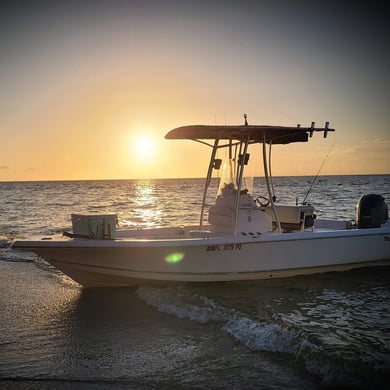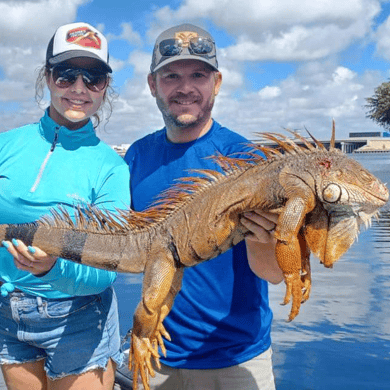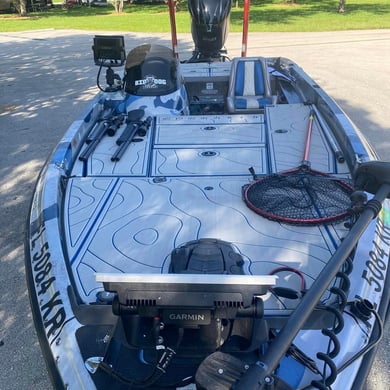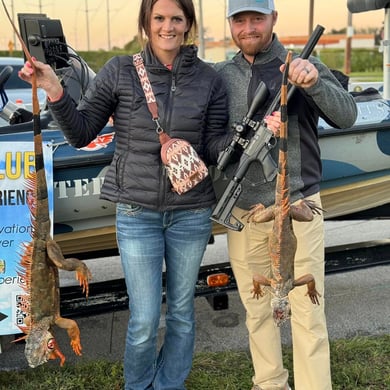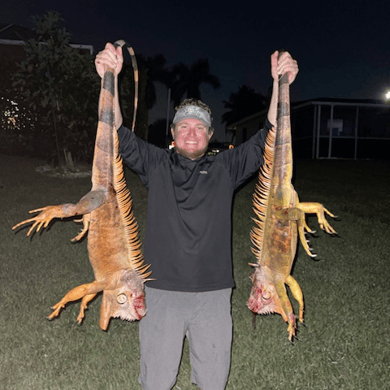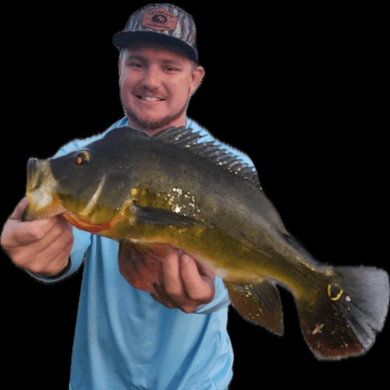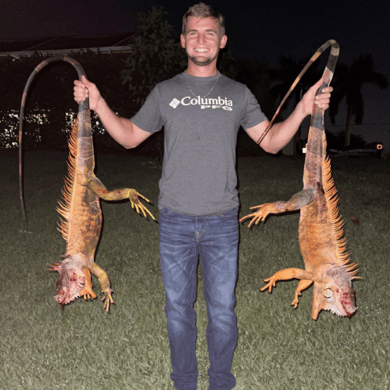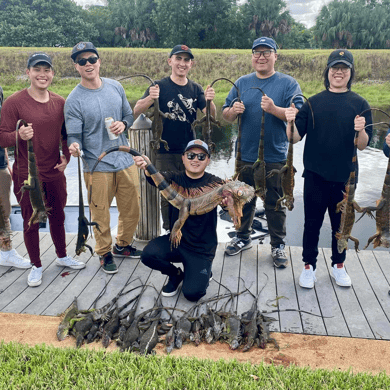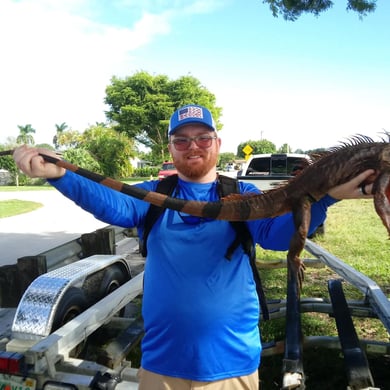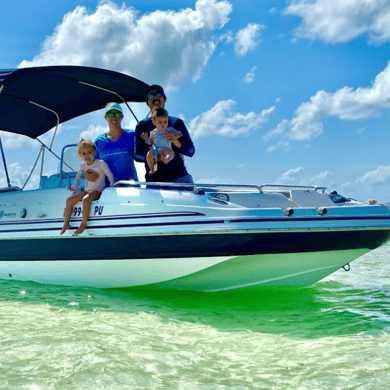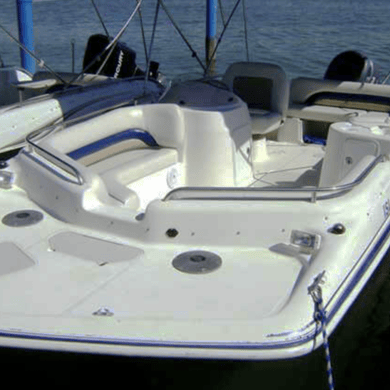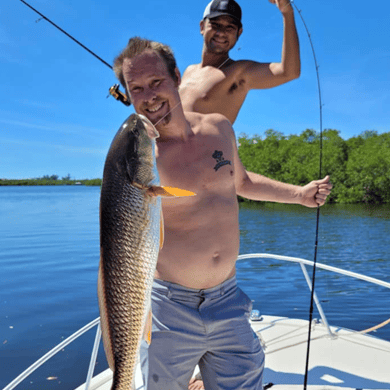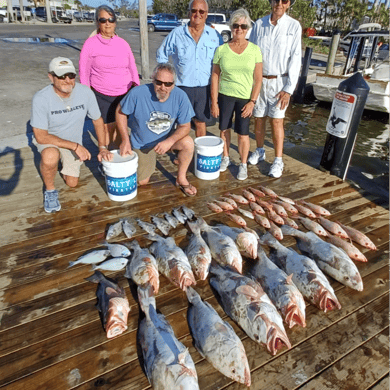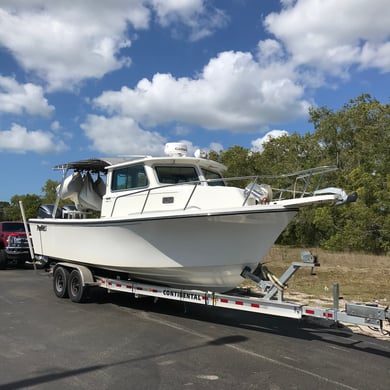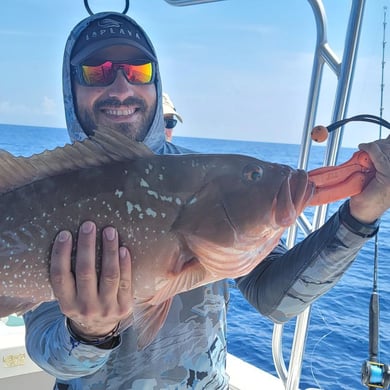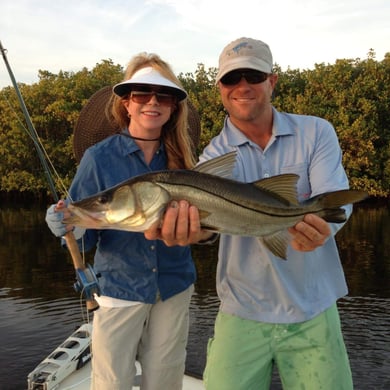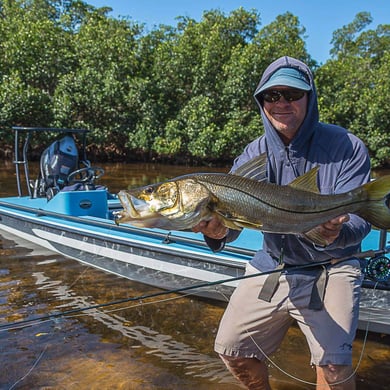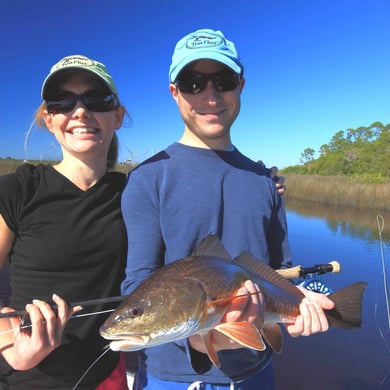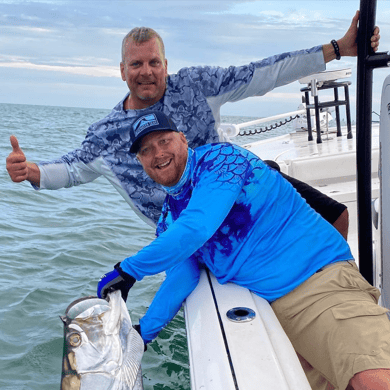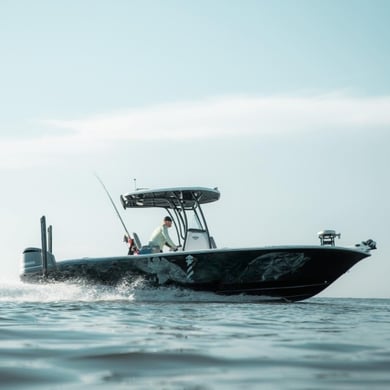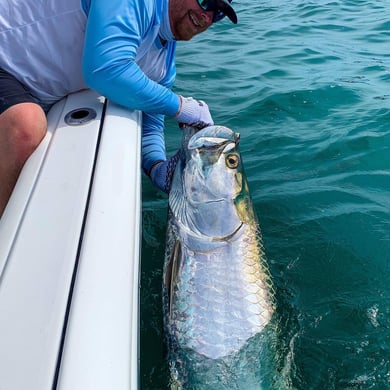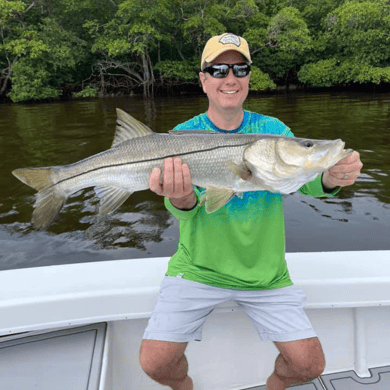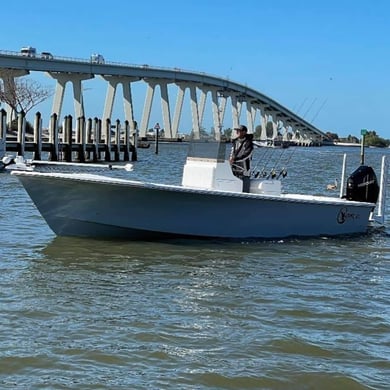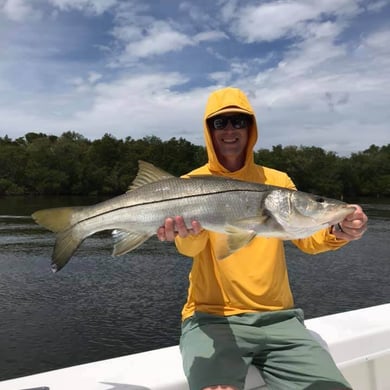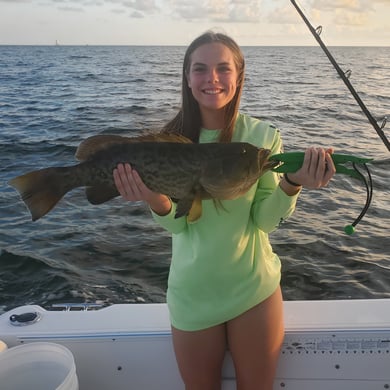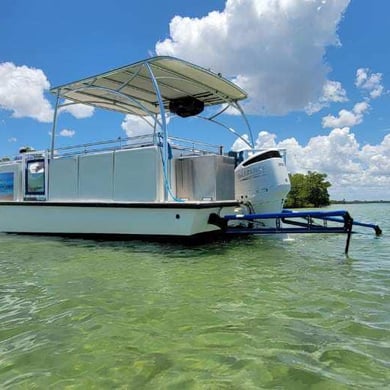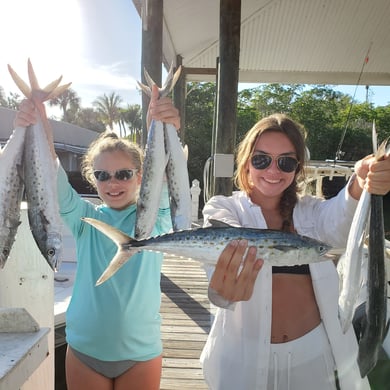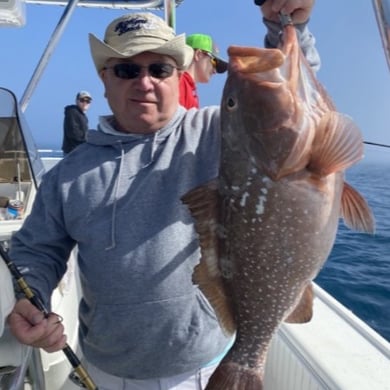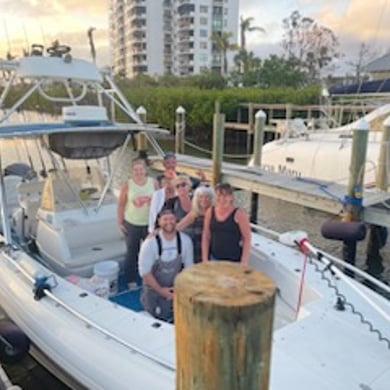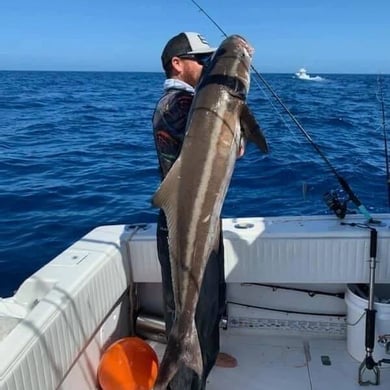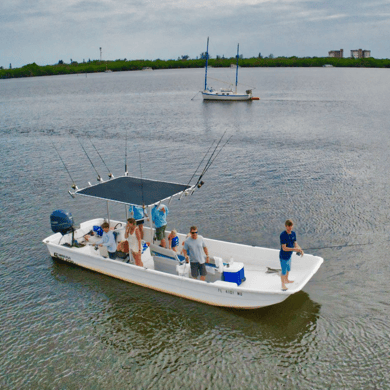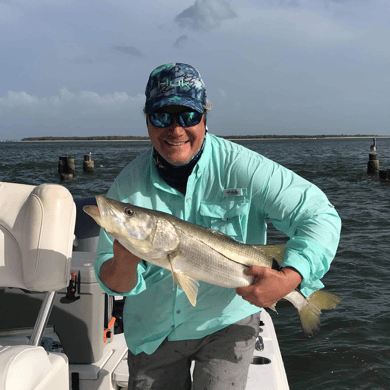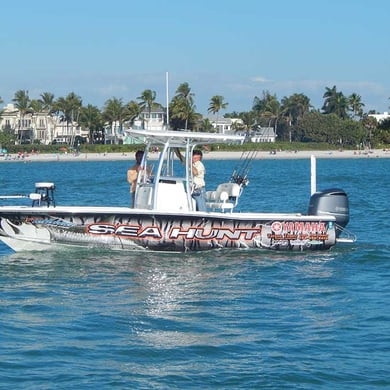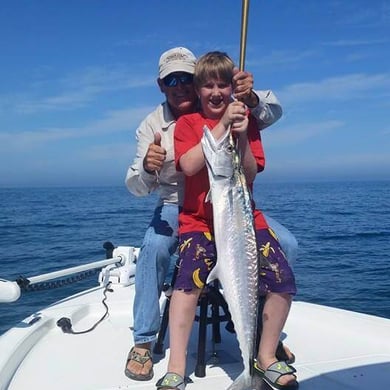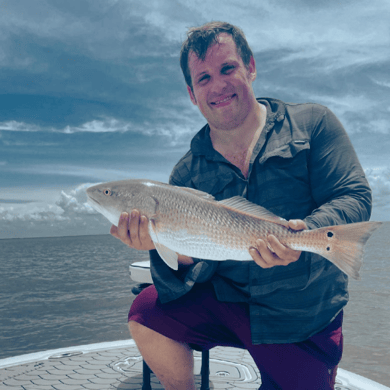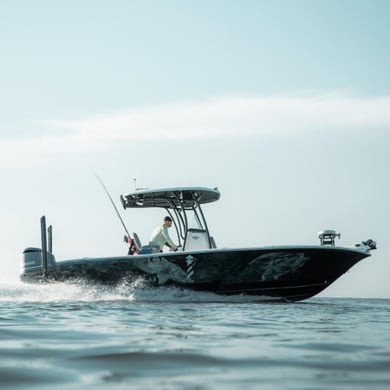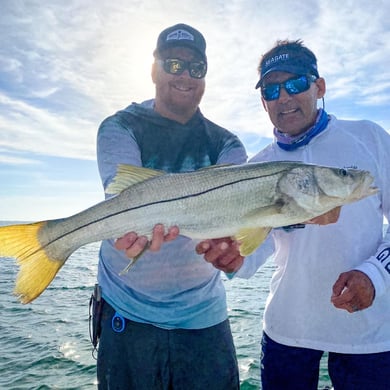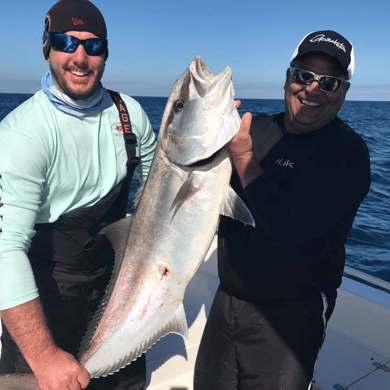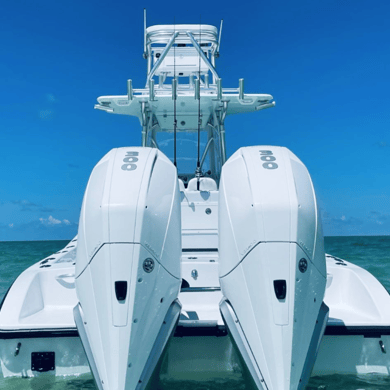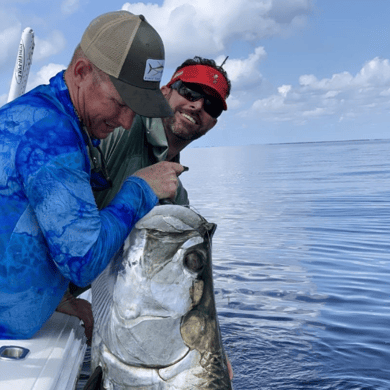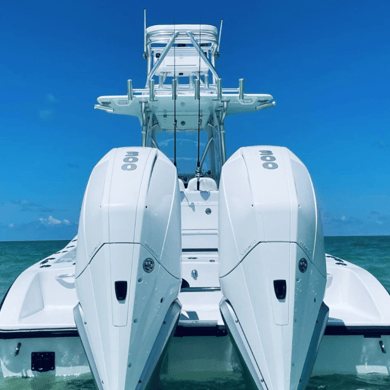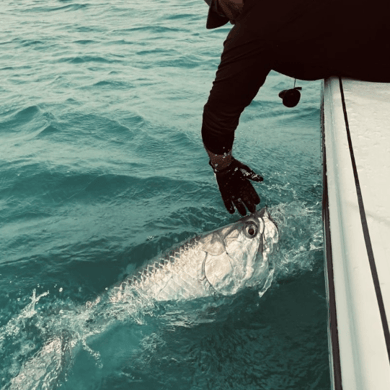Damn Good Guides
Experts Available 24/7
100% Weather Guarantee
Recently Booked Invasive Species Hunting Guides In Fort Myers Beach
Invasive Species Hunting in Fort Lauderdale
Elite Guided Air Rifle Iguana Hunts
Invasive Species Hunting in Cape Coral
Iguana Bow Hunt & Bowfishing Combo
Invasive Species Hunting in Cape Coral
Peacock Bass And Iguana Hunt Combo
“Our Damn Good Guides go above and beyond, and we’ve handpicked every single one. We’re passionate about the outdoors and look forward to getting you out on the trip of a lifetime, every time.”
Jonathan and Attison | Co-founders | Austin, Texas
Other Trips in Fort Myers Beach
Inshore, Flats Fishing in Fort Myers Beach
Inshore Insanity Ft Myers Beach
Inshore, Nearshore Fishing in Fort Myers Beach
Fort Myers Inshore Fishing Trip
Inshore, Nearshore, Flats in Fort Myers Beach
Back Bay Trip – 27’ Carolina
Need a Place to Stay?
Everything to Know About Booking a hunting trip in Fort Myers Beach
What are the best invasive species hunting trips in Fort Myers Beach?
The best invasive species hunting trips in Fort Myers Beach are:
Why should I book an invasive species hunting trip in Fort Myers Beach with Captain Experiences?
Our Damn Good Guides currently offer 5 invasive species trips in Fort Myers Beach, and the most popular trips in the area are Cape Coral Iguana Hunt guided by Roland, Elite Guided Air Rifle Iguana Hunts guided by Gene, and Iguana Bow Hunt & Bowfishing Combo guided by Roland.
Our guides in Fort Myers Beach are rated a 4.94 out of 5 based on 3908 verified reviews on Captain Experiences.
All guides on Captain Experiences are vetted by our team. You can access their reviews, click through trip photos, read bios to get to know them, and preview trip details like species, techniques, group sizes, and more.
Looking for kid friendly invasive species guides in Fort Myers Beach? Check out our beginner and family friendly invasive species guides in Fort Myers Beach.
What types of invasive species hunting trips are common in Fort Myers Beach?
The most commonly sought after species for invasive species hunting is iguana.
How much does a Fort Myers Beach invasive species hunting trip cost?
Prices for invasive species hunting in Fort Myers Beach can range anywhere from about $425 to $1,300, but the average price for a half day trip for invasive species hunting in Fort Myers Beach is $734.
Is booking a hunting guide worth the money?
Hiring a guide provides a number of benefits and many choose to book a hunting guide for a combination of experience, local knowledge, convenience, and cost-effectiveness.
Working with experienced hunting guides who know the best local spots and techniques can dramatically increase your odds of a great day. Having someone who is outside every day and knows the area like the back of their hand is going to give you the best chances of success.
Booking a guide is also more cost effective, especially if you only get out a handful of times per year. When you consider all of the costs you would incur on your own such as the price of a boat, maintenance, insurance, gas, high-quality gear, repairs, and more, you’ll find that DIY is sometimes not worth the expense.
Even if you’ve got a great setup already in your backyard, booking a guide also provides a great opportunity to experience new techniques, new locations, or even a chance at a new target species to knock off the bucket list.
What month is best for invasive species hunting in Fort Myers Beach?
The most popular season for invasive species hunting in Fort Myers Beach is winter, and most hunters book their trips 30 days in advance.
Where can I look through all Captain Experiences trips?
See here to browse all the trips we offer.
What is invasive species hunting in Fort Myers Beach?
Invasive species hunting in Fort Myers Beach, Florida, plays a crucial role in maintaining the ecological balance of the region’s coastal and estuarine environments. The area’s unique mix of mangroves, tidal flats, and salt marshes is vulnerable to the impacts of non-native species that can disrupt native ecosystems. Key invasive species in the Fort Myers Beach area include the lionfish and the green iguana, both of which pose significant threats to local wildlife and habitats.
One of the main strategies for managing invasive species in Fort Myers Beach is targeting the lionfish, an aggressive predator originally from the Indo-Pacific. Lionfish have become a serious problem in the Atlantic and Gulf of Mexico due to their rapid reproduction and their ability to outcompete native fish for resources. Divers and spearfishers in the Fort Myers Beach area are actively involved in removing lionfish from the waters. The clear coastal waters around Fort Myers Beach provide excellent visibility for spotting and capturing these invasive fish, helping to reduce their numbers and protect local marine ecosystems.
Another significant focus of invasive species management in Fort Myers Beach involves controlling the population of green iguanas. These large reptiles, native to Central and South America, have become invasive in the Florida environment, causing damage to vegetation and disrupting local wildlife. Local conservation groups and wildlife management teams use traps and other methods to capture and remove these iguanas from the area. By addressing the challenges posed by invasive species, Fort Myers Beach is working to safeguard its unique natural environments and preserve the balance of its coastal ecosystems.
What are the most popular months to go invasive species hunting in Fort Myers Beach?
Invasive species hunting in Fort Myers Beach is an important activity aimed at protecting the area’s delicate coastal and marine ecosystems. The region faces challenges from various non-native species, such as the lionfish, which have become increasingly common in the waters off Fort Myers Beach. These aggressive predators threaten local fish populations and coral reefs by consuming a wide range of native species. To manage their impact, hunting efforts are typically concentrated from spring through fall, when conditions are ideal for divers and underwater visibility is at its best.
In addition to lionfish, the Fort Myers Beach area also deals with invasive plant species, such as the Brazilian pepper tree, which can quickly overtake native vegetation and disrupt local habitats. Management of these invasive plants is usually handled through targeted removal efforts conducted throughout the year. Community groups and conservation organizations often coordinate events and volunteer days to tackle these problems, ensuring that local flora and fauna can thrive.
Overall, invasive species hunting in Fort Myers Beach plays a crucial role in preserving the region’s natural environment. By actively removing these harmful species, local conservationists help maintain the balance of ecosystems and support the health of native wildlife. This ongoing effort not only enhances the natural beauty of Fort Myers Beach but also contributes to the long-term sustainability of its diverse habitats.
What techniques are popular for invasive species hunting in Fort Myers Beach?
In Fort Myers Beach, Florida, invasive species hunting is essential for maintaining the health of local ecosystems. One significant focus is on invasive fish species like the lionfish. Lionfish have become a major problem in the region's waters due to their voracious appetites and lack of natural predators. Hunters typically use spearfishing techniques to target these fish, as it allows for precise removal from coral reefs and seagrass beds. By effectively managing the lionfish population, hunters help protect native marine life and restore balance to the local aquatic environment.
Another important area of invasive species management in Fort Myers Beach involves tackling invasive plant species, such as Brazilian pepper and air potato. These plants can quickly spread and outcompete native vegetation, leading to changes in local habitats. Techniques for managing these invasives include physical removal, where hunters and volunteers cut or pull out the plants, and the application of targeted herbicides to prevent regrowth. This approach helps to preserve native plant communities and maintain the ecological balance in the region’s wetlands and coastal areas.
Additionally, invasive species hunting in Fort Myers Beach extends to terrestrial threats like the feral hogs that sometimes invade surrounding areas. These animals can cause significant damage to local ecosystems by rooting up vegetation and disrupting wildlife habitats. Hunters use a combination of traps and firearms to control their population. Proper management of these feral hogs helps prevent further ecological damage and supports the health of the natural environment. In Fort Myers Beach, invasive species hunting is crucial for protecting and preserving the diverse ecosystems that define the region.
What species are popular for invasive species hunting in Fort Myers Beach?
Invasive species hunting at Fort Myers Beach focuses on managing several non-native species that threaten local ecosystems. One of the primary targets is the lionfish. With their striking appearance and venomous spines, lionfish are an invasive predator that has established a significant presence in the waters around Fort Myers Beach. They are commonly found in coral reefs and seagrass beds, where their predatory habits threaten native fish populations and disrupt the balance of marine ecosystems. Hunting lionfish helps control their numbers and protect local marine life.
Another notable invasive species in the Fort Myers Beach area is the green iguana. These large reptiles have become problematic in urban and suburban environments due to their destructive feeding habits, which can damage landscaping and local vegetation. They are often seen in the area’s gardens and parks. Managing their population through targeted hunting and removal efforts helps mitigate their impact on local flora and contributes to maintaining the balance of the urban ecosystem.
Additionally, the Brazilian pepper tree is an invasive plant species that affects the local environment by outcompeting native vegetation and altering habitats. While not hunted in the traditional sense, controlling the spread of Brazilian pepper trees through removal and management is crucial for preserving local plant diversity and ecosystem health. Effective invasive species management at Fort Myers Beach involves addressing the challenges posed by lionfish, green iguanas, and Brazilian pepper trees to protect and restore the area's natural habitats.
Recent Reviews
Other Types of Hunting in Fort Myers Beach
Featured Cities
- Fishing Charters Near Me
- Austin Fishing Guides
- Biloxi Fishing Charters
- Bradenton Fishing Charters
- Cabo San Lucas Fishing Charters
- Cancun Fishing Charters
- Cape Coral Fishing Charters
- Charleston Fishing Charters
- Clearwater Fishing Charters
- Corpus Christi Fishing Charters
- Dauphin Island Fishing Charters
- Daytona Beach Fishing Charters
- Destin Fishing Charters
- Fort Lauderdale Fishing Charters
- Fort Myers Fishing Charters
- Fort Walton Beach Fishing Charters
- Galveston Fishing Charters
- Gulf Shores Fishing Charters
- Hatteras Fishing Charters
- Hilton Head Fishing Charters
- Islamorada Fishing Charters
- Jacksonville Fishing Charters
- Jupiter Fishing Charters
- Key Largo Fishing Charters
- Key West Fishing Charters
- Kona Fishing Charters
- Madeira Beach Fishing Charters
- Marathon Fishing Charters
- Marco Island Fishing Charters
- Miami Fishing Charters
- Montauk Fishing Charters
- Morehead City Fishing Charters
- Naples Fishing Charters
- New Orleans Fishing Charters
- New Smyrna Beach Fishing Charters
- Orange Beach Fishing Charters
- Panama City Beach Fishing Charters
- Pensacola Fishing Charters
- Pompano Beach Fishing Charters
- Port Aransas Fishing Charters
- Rockport Fishing Charters
- San Diego Fishing Charters
- San Juan Fishing Charters
- Sarasota Fishing Charters
- South Padre Island Fishing Charters
- St. Petersburg Fishing Charters
- Tampa Fishing Charters
- Tarpon Springs Fishing Charters
- Venice Fishing Charters
- Virginia Beach Fishing Charters
Didn't Find What You Were Looking For?
Our guides are Damn Good Guides, which means they’re vetted by our team of outdoor experts who know them on a first-name basis. We hand pick each and every one of them, and our network spans all across the US and beyond.
The proof is in the pudding, and we’re incredibly proud of our 4.9 / 5 average review score. Hit the button below to see more trip options:

